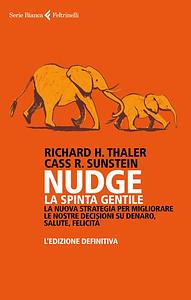You need to sign in or sign up before continuing.
Take a photo of a barcode or cover
Even "libertarian paternalism" is still paternalism, y'all.
jälle selline raamat, millest pool on täiesti asjalik ja huvitav ja siis poole pealt muutub mingiks USA-spetsiifiliseks rändiks, mis on mu jaoks mõttetu ja igav (ja kuna raamat juba 10 aastat vana, siis nüüdseks ka vavanenud). ehk siis: täiesti rahulikult võib osad IV ja V lugemata jätta.
aga muidu, jah, mõnusalt loetav selgitus selle kohta, kuidas inimesed töötavad ja kuidas neid saab mõjutada paremaid valikuid tegema, ja käsitletakse ka seda, kas üldse ja kuidas on seda teha eetiline. nagu öeldud, kümme aastat on möödas ja osa neist asjadest maailmas mitmes kohas juba ära tehtud, aga see on siis pigem teooriale heaks tõestuseks.
aga muidu, jah, mõnusalt loetav selgitus selle kohta, kuidas inimesed töötavad ja kuidas neid saab mõjutada paremaid valikuid tegema, ja käsitletakse ka seda, kas üldse ja kuidas on seda teha eetiline. nagu öeldud, kümme aastat on möödas ja osa neist asjadest maailmas mitmes kohas juba ära tehtud, aga see on siis pigem teooriale heaks tõestuseks.
One word: boring. And I'm saying that with all the respect. It could be covered in half pages for the content it exposes.
Mixed feelings about this one. On the one hand, I find behaviour economics really interesting and Nudge has clearly had a big impact on this field, but it does just feel incredibly dated now. Originally published in 2008, not only has the science move on in the last 14 hours, but the writing approach just feels very old-fashioned. It's also bizarre in how openly political it is - Thaler comes clean about being a paternal libertarian right from the beginning of this book and so it has lots of "big government is evil" messages throughout. Again, given how much politics has moved on from the 00s, it just makes the book feel very dated.
informative
slow-paced
informative
slow-paced
hopeful
informative
inspiring
medium-paced
One of those books where pieces will stick with you for a while. Some sections more interesting than others. Was recommended this book by a friend who knows my work overlaps with the type of research in the book.
An interesting first part, it helps highlight how gentle nudges can help people make helpful (to themeselves) decisions. There is a danger where such tactics can be used by advertising companies for more "sinister" uses, but overall it can be useful in the workplace and certain governement policies, for example regarding Environmental Protection, Lower Emissions etc.
My main issue is that the second (and largest) part mentions heavily US society and government policies by the G.W.Bush Administration (2001-2008), and as such is pretty useless and uninteresting outside of the USA. Furthermore, it is dated because most policies mentioned are prior to Obama's presidency, and, more importantly, prior to the financial crisis of the late 2000s.
My main issue is that the second (and largest) part mentions heavily US society and government policies by the G.W.Bush Administration (2001-2008), and as such is pretty useless and uninteresting outside of the USA. Furthermore, it is dated because most policies mentioned are prior to Obama's presidency, and, more importantly, prior to the financial crisis of the late 2000s.


